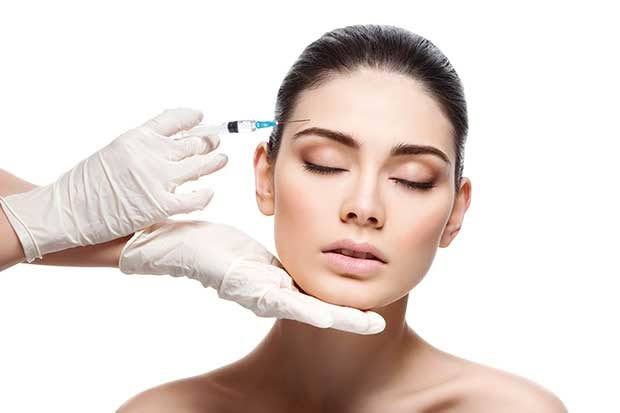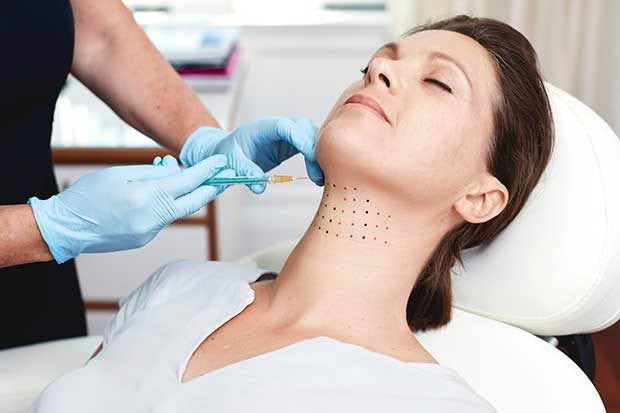Beauty trends: have you given Botox a fair chance?

Want skin that looks film-star fab and forever wrinkle-free? Develop a more trusting relationship with needles say the experts.
Words:: Tracey Strange-Watts
At 54, the face that regards me in the mirror often looks older than I feel. Genetics, fortune (good and bad) and half a century of sun have etched lines that all the green smoothies in the world couldn’t reverse. Is it, as Coco Chanel said, the face I deserve?
I’m not sure. I like most of my wrinkles. I just don’t think the lines dragging my smile down are anything to giggle about. Over the years, soft tissue has slid down my face, producing laughter lines and making my cheekbones look flatter, my jawline wider and jowls more noticeable. In repose, I look decidedly unamused.
“No one likes to look grumpy or sad when they’re feeling quite the opposite,” says appearance-medicine specialist Dr Teresa Cattin, who owns FaceWorks on Auckland’s North Shore.
People often come to her because they’re tired of explaining to friends and family that they’re not feeling cranky. “Having a perpetual frown or downturned mouth thanks to getting older is one of the most common reasons for Botox.”
At Epsom’s Clinic 42, Dr Ellen Selkon, an executive member of the College of Cosmetic Medicine, agrees and says that, properly done, injectable treatments such as Botox and fillers will alter facial expressions without robbing you of control.
“The frozen, possum-in-the-headlights look that people fear isn’t a reality. Subtlety is key. The idea is to provide results that only you notice – the most others might think is that you’re looking happier or more relaxed.”
BABY STEPS
Teresa, former president of the New Zealand College of Appearance Medicine (now the Society of Cosmetic Medicine – NZSCM) and a Botox trainer, practices what’s known as La French Touche, a series of micro-injections to soften and refresh features rather than change them entirely.
Also tagged as baby Botox, the technique takes a personalized, rather than one-size-fits-all, approach to rejuvenation but its success lies mostly in the skills of the operator. Look at it this way: if you get a bad haircut, are scissors or the stylist to blame?
Like any drug, Botox, a purified protein made from a toxin produced by the bacterium Clostridium botulinum which temporarily blocks the body’s response to acetylcholine (the chemical that tells the muscles to contract), can be prescribed incorrectly.
Inject too much in one place, too little in another and the results are disarming: glassine foreheads, Spock eyebrows, droopy eyelids… “Let’s just say precision is required,” says Teresa.
So, choose your therapist with care, paying attention to their experience. “We think of your face in a three-dimensional way, quite differently to how you see it,” she says. “Find someone who is properly trained and be open to their suggestions.”
It’s the same with dermal fillers, the largest category of which is made of hyaluronic acid, a naturally occurring sugar capable of holding 1000 times its weight in water. As with the botulinum toxin, various brands are available, all with variants. But most experts agree that the differences are minor.

“There have, however, been quite a few changes to the way we do things,” says Ellen, an executive member of the College of Cosmetic Medicine and also an appearance-medicine trainer. “For example, we now use an automated gun called a Teosyal Pen, rather than a single needle, to deliver filler to the lips and lip lines.
There’s less swelling, less pain – the lips can be a bit stingy – and less chance of trout pout.”
The pen, which can also be used with multi-needles, nine-points for the face and five-points for areas such as the hands, is also used for a therapy called Photo Finish ($1100 for about six months).
This treatment, exclusive to Clinic 42, combines botulism toxin with hyaluronic acid injected into the superficial layers of the skin.
It is said to smooth fine lines and restore hydration, luminosity and tone. “We’re seeing great results, especially for people who feel they look tired or drawn, or who believe their skin has lost that youthful-looking radiance,” Ellen says.
“The best thing is that it is both corrective and preventative, working immediately and over time.” (Needling encourages the body’s production of collagen.)
DOUBLE FAULT
Another new treatment, one available throughout the country, is the double-chin-reducing Belkyra. Developed by the maker of Botox – Allergan – it involves injections of a prescription medicine containing deoxycholic acid, long used in cosmetic surgery, to dissolve fat around the jawline, neck and under the chin for a more contoured look.
With up to 40-odd injections involved, the procedure isn’t without discomfort despite the use of numbing cream, nor is it cheap ($3000 for two treatments with $1500 for follow-ups to a maximum of six) but the results are permanent – the compound breaks down fat cells which are then eliminated by the body. Swelling and pain afterwards are common.
For research, Ellen tried one treatment without local anaesthetic. “I looked like a bullfrog afterwards,” she says. “So I wouldn’t recommend it immediately before a special event. And I wouldn’t advise it without some form of numbing – we often inject local anaesthetic instead of using numbing cream. But results are very positive.”
OH MY!
If neck injections aren’t enough to make you squirm, how about some in the vagina? The O-Shot (up to $2000 a pop) involves injecting a patient’s own platelet-rich plasma (PRP) high into the vagina to improve sexual sensitivity and enhance sex drive.
Offered relatively widely, including at Auckland’s The Face Place, the procedure relies on the regenerative cells to rejuvenate vaginal tissue, and also improves urinary incontinence. Immediate results are claimed for stress incontinence; results for improved sexual health can take from three weeks to six months.
The O-Shot is related to PRP facials, sometimes known as vampire treatments. “I think PRP is one of the most undervalued treatments,” says Ellen. “The reason might be that there isn’t an immediate wow. It really is an investment in the future.”
Here’s how it works. A doctor takes a blood sample which is then spun in a centrifuge to create concentrated PRP and injected back into the skin where, over time, it naturally regenerates and renews skin tissue.
It sounds gory but numbing cream is used to take away the sting and while there will be a little redness, by day two the skin should look normal. The fact your body’s own blood is being recycled means the procedure is also extremely safe. Two to three sessions are usually recommended at a cost (at Clinic 42) of $1500 to $2000 each.
NEEDLE TIPS
● Before going under the needle consider your budget. As with most things, you get what you pay for. Prices will vary slightly depending on where you live and the product used.
Botox typically starts at about $350 per treatment site so if you spot cheaper deals, start wondering why. (While it is rare, it is not uncommon for a product to be diluted or for it to be a knock-off.)
It’s also common for nurses, rather than fully-fledged doctors, to do injections and many clinics will reflect that in their prices (the nurse will be cheaper). It also pays to be flexible: botulism toxin is charged by the unit, which means you may need more than you budgeted for. If that’s the case, save up until you can afford the treatment that has been recommended; the results will be better.
● Procedures such as Botox and dermal fillers usually take minutes with little or no downtime.
With Botox you may get a little bruising, which is easily disguised by makeup, and you will be advised not to exercise for 24 hours since increased blood circulation means your blood might sweep away some of the product from the injection site. It’s slightly different with fillers; some swelling, especially around the lips, is common, so don’t schedule an appointment directly before a big event. (Also, don’t book an appointment to have your teeth cleaned in the days after. When teeth are cleaned, bacteria are released into the mouth and bloodstream. The body recognizes fillers as a foreign substance and excess bacteria may increase the risk of infection.)
● Results for Botox and fillers are different. Generally, fillers last longer (anywhere up to 18 months) whereas Botox lasts from four to six months.
Love this story? Subscribe now!
 This article first appeared in NZ Life & Leisure Magazine.
This article first appeared in NZ Life & Leisure Magazine.
